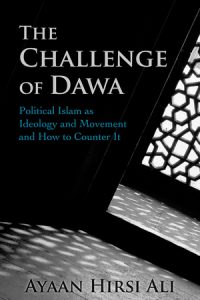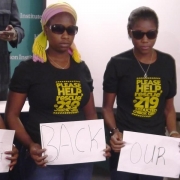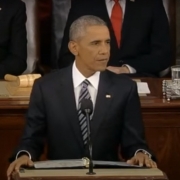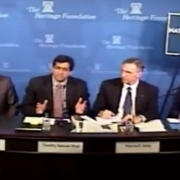Can Ayaan Hirsi Ali Liberate Islam from Islamism?
By Andrew Harrod, PhD, exclusive to Religious Freedom Coalition
 “Dawa is to the Islamists of today what the ‘long march through the institutions’ was to twentieth-century Marxists,” writes Ayaan Hirsi Ali in her latest monograph, The Challenge of Dawa: Political Islam as Ideology and Movement and How to Counter It. In it the Somali-born political activist accurately analyzes the threat of, and necessary response to, Islam’s faith-based political ideology, yet the feasibility of her desire to reform this “Islamism” out of Islam is questionable.
“Dawa is to the Islamists of today what the ‘long march through the institutions’ was to twentieth-century Marxists,” writes Ayaan Hirsi Ali in her latest monograph, The Challenge of Dawa: Political Islam as Ideology and Movement and How to Counter It. In it the Somali-born political activist accurately analyzes the threat of, and necessary response to, Islam’s faith-based political ideology, yet the feasibility of her desire to reform this “Islamism” out of Islam is questionable.
Analyzing dawa’s call to Islam, Ali calls for a “paradigm shift that recognizes how violent jihad is intertwined with the ideological infrastructure of dawa,” the “subversive, indoctrinating precursor to jihad.” Reflecting a commonplace myopic focus on jihadists, President George W. Bush “often referred to a ‘war on terror,’ but terror is a tactic that can be used for a variety of ideological objectives.” Accordingly, “nonviolent and violent Islamists differ only on tactics; they share the same goal, which is to establish an unfree society ruled by strict sharia law.”
Officials like President Barack Obama, who often appeared “as if he worried more about ‘Islamophobia’ than about radical Islam,” blinded the government to Islamic doctrine, Ali notes. Therefore “[s]ince 9/11, the United States has committed a series of blunders in partnering with ‘moderates’ who turned out to be either Islamists active in dawa or fully fledged terrorists.” Additionally, “nonviolent Islamists have benefited from terror attacks committed by jihadists because such attacks make nonviolent Islamists appear moderate in the eyes of Western governments.”
Ali sees positive indications that President Donald Trump is taking a “more comprehensive approach” to “defeat political Islam (or Islamism)” and offers her own proposals for this strategy. Among other measures, public diplomacy entities like Voice of America should “fight the war of ideas by disseminating a counter-dawa message.” The United States also should also apply “ideological scrutiny” to immigrants, refugees, and military chaplains.
Ali carefully distinguishes between personally devout Muslims and those following a totalitarian ideology. “‘Islam,’ ‘Islamism,’ and ‘Muslims’ are distinct concepts. Not all Muslims are Islamists, let alone violent, though all Islamists—including those who use violence—are Muslims.” Therefore the “religion of Islam itself is indeed capable of reformation.”
Ali’s distinction between Islam in general and its political elements in Islamism derives from the canonical biography of Islam’s prophet Muhammad in seventh century Arabia. She contrasts his early prophetic career when he was merely a preacher in Mecca with the polity he and his followers later founded in Medina. She differentiates between “Mecca Muslims, who prefer the religion originally promoted by Muhammad in Mecca” and “Medina Muslims, who embrace the militant political ideology adopted by Muhammad in Medina.”
Notwithstanding worldwide disturbing polling data, Ali questionably asserts that “Mecca Muslims” are the “clear majority throughout the Muslim world.” They “are loyal to the core religious creed and worship devoutly but are not inclined to practice violence or even intolerance toward non-Muslims.” Yet a “fundamental problem is that the majority of otherwise peaceful and law-abiding Muslims are unwilling to acknowledge, much less to repudiate, the theological warrant for intolerance and violence embedded in their own religious texts.”
“Muslim reformers” or “modifying Muslims” form Ali’s third Muslim subgroup. They “promote the separation of religion from politics and other reforms” and “realize that their religion must change if its followers are not to be condemned to an interminable cycle of political violence.” Thus the “future of Islam and the world’s relationship with Muslims will be decided by which of the two minority groups—the Medina Muslims or the reformers—wins the support of the Meccan majority.”
Ali’s own analysis of Europe’s Islamic immigration gives an ominous portent for the struggle between Medina and reform. She observes that “emigration, called hijra, is central to Islam and—more importantly—to the mission of Islamization to this day,” as shown by the exile of Muhammad and his companions to Medina, the start of the Islamic calendar. True to Muhammad’s Medina example:
Forty or fifty years ago, it was still widely believed that the migration of Muslims to Europe, whether as ‘guest workers,’ immigrants, or refugees, would lead to their secularization and assimilation. Americans who assume that this will happen in the United States should take note that the opposite has happened.
European Muslims are not the only disappointment for Ali’s Muslim reformer allies like former Wall Street Journal reporter Asra Nomani, with whom Ali jointly testified before the Senate on June 14. She has joined with like-minded Muslims worldwide such as Zuhdi Jasser, who makes in his longstanding “Battle for the Soul of Islam” precisely Ali’s same distinction between Islam and Islamism. Yet their Muslim Reform Movement has suffered sobering setbacks in America.
Several logical reasons explain why the Muslim reform failures of Ali et al. are not surprising. Whatever moral inclinations Muslims might have, her Mecca/Medina distinction demands that Muslims somehow eschew Muhammad’s political practice while still viewing him as a religious authority. Yet as the example of Jews and Christians show, over time mainly orthodox are faithful to religions, not people who split differences over prophetic examples.
By contrast, the liberal spirit advocated by Ali could very well lead freethinkers like her not to orthodoxy, but rather to her atheism or another belief system like Christianity, particularly in light of Islam’s numerous legalisms. She strives to separate Islamic politics and piety, yet certainly many remain within Islam’s fold not out of sincere conviction, but coercion. Even in “moderate” Indonesia, Islamic repression exists in the form of blasphemy laws.
Ali at her Senate testimony raised eyebrows when she ominously described the Netherlands’ second largest party as a “radical right wing group.” As knowledgeable observers like this author in the hearing room instantly recognized, she was anonymously referencing the Freedom Party of Geert Wilders. While she has many sound policy proposals, time will tell who is more radical, Ali or Wilders, a strident critic of Islam who has personally explained to this author severe doubts concerning Islam’s reform.
To purchase her autobiography, click here.
[su_box title=”About Andrew Harrod”]Andrew E. Harrod is a researcher and writer who holds a PhD from the Fletcher School of Law and Diplomacy and a JD from George Washington University Law School. He is a fellow with the Lawfare Project, an organization combating the misuse of human rights law against Western societies. He can be followed on twitter at @AEHarrod.[/su_box]





Trackbacks & Pingbacks
[…] to the recent thinking of the Muslim apostate Ayaan Hirsi Ali, Douglass-Williams’ interviewees distinguish between […]
Leave a Reply
Want to join the discussion?Feel free to contribute!